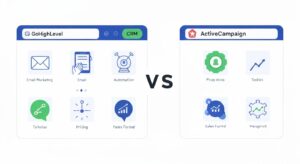CRM Playbooks vs Ad Hoc Tactics: Why Strategy Wins in Agencies

As an organization grows, there comes a time when gut feelings and quick decisions aren’t enough. A founder who personally handles leads, a close-knit staff that takes advantage of opportunities as they come up, and open systems that function because everyone is participating may all help a business get off to a good start. But its early growth might conceal problems with how it’s made. As the firm expands, it starts to show signs of weakness.
When salespeople rely on memory and random touch, they miss out on chances. People notice when you don’t train them the same way every time. When people work for different bosses, leaders can’t make good plans. Things that used to be flexible are becoming less flexible. Now it’s clear what the difference is between CRM playbooks and plans that are made up on the spot. Over time, agencies that do well don’t just hope to do well; they set up ways to do well over and over again.
For long-term growth, there needs to be a clear CRM plan for agencies. It makes what works the standard. This way, every lead, deal, and client experience follows a steady, good path. Instead of constantly improvising, teams follow a proven structure that keeps momentum moving forward.
The Problem with Ad Hoc Tactics
Many agencies begin with informal systems because they seem fast and easy. A spreadsheet might track leads, a shared inbox might serve as the communication hub, and team members rely on personal reminders to follow up. For a handful of clients, this approach can feel manageable. Everyone knows what’s happening because the operation is still small enough to keep in their heads.
But as soon as the agency takes on more clients or hires new team members, the entire system starts to strain. Leads get lost because no one knows exactly who should follow up. Prospects stop being interested in you in the middle because there isn’t a planned way to grow them. It’s hard to keep track of all the info because different people do it in different ways. The sales cycle is less stable because of this, and people don’t always understand why it slows down.
It’s up to the people who work for the business to make ad hoc ways work. Important knowledge and progress are lost when a key person quits, gets busy, or takes time off. After that, growth is weak and hard to keep up. Things that used to feel flexible are beginning to look more like chaos.
How a CRM Playbook Creates Structure
A CRM plan is like a road map for how a business should interact with clients and potential customers. It says how to get leads, move opportunities forward, when to follow up, how to organize contact, and how to measure success. More importantly, it builds these steps into the CRM so they always happen, without having to rely on personal habits or notes.
The plan gives you a clear road to follow instead of treating each new chance as a blank page. The organized flow makes sure that nothing is lost for each prospect. Deals stay on track with automated prompts. Everyone on the team can see what was said because it is written down. The way the data is gathered makes it possible to analyze it in a practical way, rather than just throwing information around.
This change affects how organizations work. Because the process is known ahead of time, deals go more quickly. Prospects get steady, professional service instead of having to rely on whoever answers their question at the time. Leaders can see what’s working and what’s not, which makes it easier to change strategy rather than trying to fix problems after the fact.
Why Agencies Resist Playbooks
Even though the benefits are clear, a lot of companies are still hesitant to adopt a CRM plan. Some people think that order will make their work less flexible and less artistic. Structure does the opposite of what it seems to do. Teams can focus on creative strategies, messages, and relationship building when they automate the regular parts of getting new clients and managing existing ones.
Some people think that making playbooks takes a lot of time and will slow them down. But it costs a lot more to not have a system. Every forgotten follow-up, missed request, or contact that comes at the wrong time could mean lost income. As the business grows, the work that went into making a clear plan keeps paying off because it gets rid of needless problems.
Also, some agency chiefs think their teams are “too small” to need a plan. Still, it’s easier to grow up if these tools are used early on. When the service grows, the method will already be in place, so there won’t be a rush to change how things are done later on.
Transforming Team Dynamics Through Structure
One of the best things about a CRM plan that people don’t think about enough is how it can change how employees work together. Everyone works from the same base when processes are clear and saved in the CRM. It is clear to sales what the chances are for each one, to account managers what was promised, and to leadership what facts they can trust to make choices.
When new employees start, they learn faster because they are coming into a clear system instead of putting together what they know on the spot. When everyone has the same knowledge, there is less miscommunication. It’s easier to see how each person is doing, but the agency’s success doesn’t rest on a few key people keeping everything together. The team works together better than when they were just a bunch of people trying to stay in sync.
This kind of clarity makes the agency’s mindset stronger. Teams know what to do, and customers always get the same level of service, no matter who they talk to. Being that reliable gives you an edge over your competitors that goes beyond any one campaign or strategy.
A Real-World Transformation
Think about a sales team at a company that was growing. They kept track of their work with spreadsheets, emails, and unclear job titles. It worked for a while, but things got worse as the client base grew. For weeks, some lines were not used. It wasn’t always possible to follow up, and the numbers that team members gave at the reporting meetings were very different.
When the business made a CRM plan, everything changed. Notes that were not clear were changed to clear steps. There were automatic reminders to make sure that no prospect was missed. Before, emails were sent all over the place, but now they are all in one place. Because information was shared in a planned way, it took less time to get going. It took less time to make sales, more deals were closed, and fewer chances were lost after just a few months.
It wasn’t because we hired more people or spent more on ads. If the government stopped winging it and started following a clear plan that could be used over and over, it would happen. Structure took the place of guessing, which led to better performance.
Strategic Alignment
To get the most out of a CRM plan, it’s best for companies to make sure it works with the main tools they already use. When the CRM is made for agency processes like lead gathering, communication, analytics, and automation, the plan fits right in with daily tasks. With this agreement, there is less friction, and the strategy feels less like an add-on and more like the core of how the agency works.

Conclusion
What sets ad hoc strategies apart from a CRM plan is the difference between following through and taking the lead. Agencies that use loose, uneven methods may get results in the short term, but they have a hard time keeping up with the work when it gets busier. Every step of the client journey is made clearer, more accountable, and more predictable by a CRM playbook for agencies.
Agencies make systems that help growth happen instead of stopping it by making the way leads are managed, follow-ups are handled, and communication moves official. This system doesn’t get in the way of creation; it encourages it. Teams spend less time putting out fires and more time providing value that is important to the business.
In a market with a lot of competition, firms that use organized CRM playbooks are better able to grow steadily and over time. Improvisational groups reach a limit at some point. It’s always best to have a plan.




